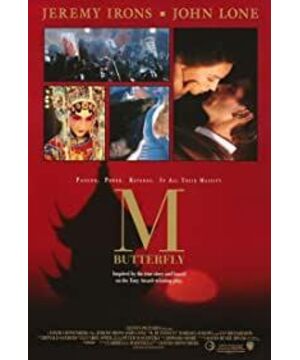She, a fragile woman, is holding a seat, crying for the lost love. The foreign devil she loved so much made her desperate. She is the Qiaoqiaosang on the stage, which is his fantasy of everything in the East. And he, staring at her tightly during the dinner, imagined being in Pinkerton, sorrowing for her unconditional love. But this love gave a man who was not worthy. . .
This is not a scene in Puccini's opera "Madame Butterfly", but a scene in David Kronberg's "Madame Butterfly". The film is adapted from the Broadway drama of the same name by Chinese American dramatist Huang Zhelun. I will not introduce the plot of the film here. Regardless of the controversy of the film, I think the Western culture and gender perception of the East revealed in it is indeed an interesting subject worth exploring.
one. The Madame Butterfly complex
can interpret this absurd story in several ways. But whether you see it as a comedy about deception and gullibility, or a chapter in the chronicle of spies, there is a major issue that needs to be explained urgently. This question is most interesting to everyone, and
it is the key to the unreality of this story: that is how can a man live with a person for eighteen years, have sex with a person, and have a child , But didn't know that his lover was also a man!
If the story in the play sounds weird, then the true version of the story can be called weird. In the American writer Joyce Wadler's novel "Liaison", she tells this legendary story that happened in China in the 1960s.
Bernard Bussico, the prototype of Gorenni, Peipu was only twenty when she first saw Song Liling's prototype, while the latter was twenty-six at the time. In Huang Zhelun's semi-fictional script, Song Liling appears in a female dress, giving the impression of a charming woman. According to Wadler, in Beijing in 1964, Shi Peipu in the true story always wore men's clothing, and no one mistaken it for a woman. As the relationship between the two deepens, Shi Peipu, the cunning, announces "his greatest secret" to Busico-he is a daughter, but he was raised as a boy. For this, it is obvious that anyone with normal intelligence and thinking ability will not believe it, let alone a person who has maintained a close relationship with him for a long time. On the contrary, Busico believed it all. Reality is sometimes more absurd than fiction, as in this story, which in turn makes the previous questions more difficult to understand and explain.
In Wadler's description, Bussico is a shy and innocent person, his head is full of adventure fantasies sprouted from the movie. In his imagination of the East, he has always had a deep-rooted concept, that is, believing that all Eastern women are gentle and submissive, and they treat their husbands loyally and unswervingly, just like men's exclusive slaves. This illusion of the East that most Western men have has been fully displayed in Puccini's operas, so people also gave it a name: Madame Butterfly complex. Interestingly, when Gorenni first saw Song Liling in the movie, the latter was playing Madame Butterfly on stage. This meaningful encounter undoubtedly strengthened Gao Renni's fantasy.
Precisely because the submissive Eastern woman is the most typical fantasy of the Western man about the East, Busico began to look at everything under his imagination, and wished to create his Shi Peipu in accordance with the image of the Eastern woman he pursued. In 1964, at the age of 20, Busico had no sexual experience before meeting Shi Peipu. His sexual jerky and awkwardness certainly explained part of his ignorance, but the most important thing stems from his various false assumptions about the Eastern world. They seldom make love, all the lingering takes place only in the dark, and they are always intimate in the peculiar posture invented by Shi Peipu. Shi Peipu, always dressed in perfect clothes, has never exposed his carcass in front of his French lover. For Busico, all of this shows that Shi Peipu is a traditional, conservative and prudent Oriental woman. He regards her reserved silence as Oriental implicitness, and her extreme shyness as a Chinese custom. This is also a topic worth exploring, because all fantasies are temporarily ignored, which also involves cultural misunderstandings. In the eyes of Westerners, China is a mysterious and unpredictable country, and all phenomena that cannot be explained by their logic are naturally regarded by them as local customs, and they never consider whether it is reasonable. On the contrary, the more difficult it is to understand, the more they are confused and even excited about the exoticism of the Eastern world. The same example can be seen in Hong Ying's novel "K". Also known as "British Lover", it describes the relationship between Woolf's nephew, British poet Julian Bell, and the female writer Ling Shuhua when he was teaching at Wuhan University in the 1930s. Just as Julian thought when facing Lin’s strong desire and mysterious nature: "...It is nothing more than Chinese superstition... But it is very exciting and very exotic", and as he wrote in a letter to his mother Said: "To be killed by such a demon, I am afraid I am also the happiest man in the West!" Busico, just like Julian Bell, can also be thought of as such a gentle and beautiful one with him. Stunner, her mystery and exoticism made him fascinated-this is the essence that makes Western men irresistible.
In the early days of their relationship, Bussico always believed that Shi Peipu was his imaginary Eastern woman willing to succumb to a Western lover. Because of this, the cunning and shrewd Shi Peipu knows how to use his fantasy to play a perfect and ideal Oriental woman in his dreams, so as to complete his mission as a spy and obtain information from him about US military operations in Vietnam. When the lie was about to be exposed, Shi Peipu used the trump card in his hand—declaring pregnancy, to continue the ecstasy soup.
On the other hand, in this dangerous game and emotional deception, Busico has always been a fool who ignores all the evidence. His romantic idealism originated from the oriental fantasy, so that he would not allow any reality to invade his dreams. Therefore, he is blinded by his own fantasy, but this blindness is ultimately voluntary, because how strongly he needs this person in front of him to be the butterfly of his dreams, and only the butterfly that controls him can make him Feel like a "real man". Therefore, his vulnerability in the face of deception can be explained by the fact that, psychologically, Peipu is a woman when he needs it too much. What Bussico fell in love with was not a person, but an imagined concept. As I mentioned earlier, Shi Peipu has helped and strengthened this concept because he slyly plays the role of a submissive and demure Eastern woman and dexterously weaves Busico's fantasy. But Busico, who was in the dark, still wishfully believed that he was the husband of the beautiful and fragile butterfly in front of him.
In this love tragedy of deception, betrayal, and loss, there is a mixture of Busico's self-deception and Shi Peipu's double-sided conspiracy. Their relationship is an absurd puzzle, and at the same time, they are mutually satisfying.
two.
The involvement of political metaphor espionage makes this story with a certain political color, which makes it impossible to analyze it without the historical and political background at that time.
The story happened in 1964, and it was in a period of change in the entire world. During this period, many Asian countries are undergoing critical political changes. Just like in China, the Cultural Revolution took place two years later, and the Red Guards "hate intellectuals" monitored the entire country. And France, after withdrawing its troops from Indochina, is losing her world status bit by bit. On the other hand, the United States was caught in the Vietnam War, and these events formed the historical background of the story.
Going back to the scene where the two met for the first time in the movie, after the performance of "Madame Butterfly", Gao Renni, who was deeply affected by the performance, told Song Liling that the story of the Japanese woman she played by suicide after being abandoned by her American lover is profound. Deeply attracted him. But Song Liling replied that he would definitely love this story, because in the eyes of Westerners, Eastern women are quiet and submissive, willing to succumb to the "butterfly" of their husband. The word "butterfly" itself also reminds people of feminine qualities such as tenderness and frailty. Therefore, "Mrs. Butterfly" has become a model of ideal Eastern women, and strongly aroused the impulsive desire of these Western men to conquer.
Song Liling's answer broke the Western impression of the East, and the meaning is not only about gender, but also political. E. Said, who put forward "Orientalism", said that all false and idealized images of Asia in Western culture are just proofs of the ambitions of colonial imperialism in Europe and the United States. And this "false and idealized image" stems from their sense of superiority as whites and powerful nations. This theme is more deeply explored in "Mr. Butterfly", just like Song Liling's severe accusation in the trial: the
West always thinks that she is male-powerful weapons, powerful industry, powerful capital-and the East It is feminine-delicate, delicate and poor, full of mysterious wisdom and enigmatic femininity. I am an Oriental, and as an Oriental, (in their view) I will never be a man.
This accusation is not only the ultimate explanation for this deception, but more like a political declaration from the East to the West, because in the eyes of the West, the East is always a victim of a woman and a spoil of enslavement.
In this sad story, Gao Renni has always played a classic fool in love. He is a victim of his overly active romantic imagination and a naive and emotional lover. He imagined himself as a machismo of Pinkerton, mixed with romantic ideals and absurd arrogance in his body. He was attracted by his exotic butterflies, but blinded by his own desires. This spy deception is a testament to the cultural imperialist fantasy of the gentle and submissive Eastern women in the West. At the same time, we can think of it as a deconstructed version of "Madame Butterfly." Gorenni imagines that he is Pinkerton, and his Oriental lover is his butterfly. But is this the case? I think at the end of the film, the monologue in prison before Gorenni’s suicide is the best interpretation of this identity reversal:
I have an oriental illusion: a slim lady wearing a Tang suit and a large dressing gown, in order to fall in love The despicable foreign devils died. They were brought up to be perfect women since they were born. They were submissive to us, and their unconditional love made them strong. This illusion became my life. My fault is simple and absolute. The man I love is not worthy of my love, he is not even worthy of a second glance. However, I gave him my love, all my love. Love distorted my judgment and blinded my eyes. At this moment, I looked in the mirror, but I couldn't see anything except. . . . I have an illusion, an oriental illusion. Deep in the almond-like eyes, there are still women who are willing to sacrifice themselves for loving a man, even if that man is not worth it. It is better to die vigorously than to live mediocre. Therefore, finally, in a prison far away from China, I found him. My name is Gorenni, also called-"Mrs. Butterfly".
In this tragic monologue, Gao Renni used "man" to allude to Song Liling for the first time, which clearly meant the disillusionment of his oriental vision. He was deceived by love and finally realized that he was Mrs. Butterfly, and Song Liling, who ruthlessly ruined his love, was the true Pinkerton.
The reversal of identity leads to political metaphors built on deep thinking about the relationship between East and West. This kind of thinking is firstly gender-based, and secondly cultural and political. It is closely connected with Westerners' ideas of the East. In their view, the East is feminine, mysterious, submissive, and enslaved. But in "Mr. Butterfly", the failure of Western men in this relationship turns the story into a symbolic political fable, which is a great allegory of the naivety and ignorance of white colonialism. Gao Renni, his destiny is undoubtedly a symbol of the disillusionment of Western imperialism, and it is also a heavy blow to the brazen Eurocentrism and their political arrogance.
I still remember that in the movie, Gorenni told the ambassador very firmly that Vietnam would succumb to any force from the United States, but Song Liling said that the West will eventually fail in all affairs with the East. At least in this story, the butterfly of the East, in the contest with the West, this time, is victorious.
"Mr. Butterfly" is a cultural observation and thinking about the East and the West. It has the idealization of gender roles, the extremeization of illusions, and many themes about racism, sexism and imperialism.
For Gao Renni, he has been deceiving himself over the past eighteen years. His Western machismo fantasies of submissive Eastern women are all based on Western imperialist dreams. Therefore, he too needs to control and dominate a gentle and weak oriental woman to complete his various fantasies. Song Liling, who knows the truth well, knows how to show the mysterious, romantic and exotic atmosphere of the East by all means in front of him. Her manipulation is perfect because she knows too well what a man wants to find from a woman, and his fantasies. Those who question the authenticity of this story ignore the infinite potential of fantasy in the human spirit, and therefore cannot understand a person who is blinded by fantasy, and of course ignores this. How the illusion metaphors the relationship between the East and the West.
"Mr. Butterfly" exposes this Western imperialist fantasy through the love affair between a French diplomat and a famous Peking opera actress. The irony is that all the images of the East that are considered inevitable by the West, such as the West dominating and the East enslaved, have been overthrown in this love affair. In the contest with the East, the West cannot always have the upper hand. Their superiority and arrogance will one day slap them in turn, just like in "Butterfly".
2009.6.21
View more about M. Butterfly reviews











